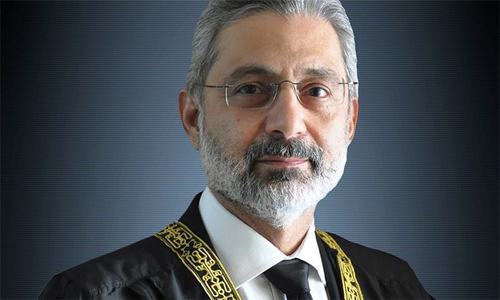ISLAMABAD: The senior counsel representing Justice Qazi Faez Isa wondered on Tuesday whether a judge should necessarily be put under detention or suffer other indignations to cross the yardstick of establishing that his dignity and privacy had been invaded upon.
“Nobody leaves a trail to prove about the instances of the invasion of privacy and covert surveillance against a judge,” argued Advocate Muneer A. Malik. The counsel was drawing comparison to the events after March 9, 2007, when former chief justice Iftikhar Muhammad Chaudhry was subjected to such abuses during the regime of then president General Pervez Musharraf.
Advocate Malik highlighted the need for the laying down of guidelines by the Supreme Court while adjudicating on the case at hand, spelling out what the executive could do or not do, so that no judge could be deprived of his privacy.
Justice Umar Ata Bandial, while heading a 10-judge full court hearing a set of petitions against the filing of the presidential reference against Justice Isa, observed that the court should not lay down high standards while deciding the present case. The Constitutional provision did not only deal with superior court judges, but it also dealt with the federal ombudsman, auditor general, members of the Election Commission as well as NAB chairman, the judge said, adding that otherwise everybody against whom the procedure for removal would commence under Article 209 would approach the SC by challenging the same.
“When it comes to a judge, then this court has to sit at the highest pedestal,” retorted the counsel. And when the court observed whether the counsel was hinting at something, the counsel recalled the saying: “When they come for the trade unionist to pick him up, I remained silent because I was not the one, and when they come for the Jews and I remained silent, and when they came for me, nobody was left to speak for me.”
At this, Justice Faisal Arab observed that the SC always intervened when it felt that injustice had been done.
On Tuesday, Justice Muneeb Akhtar observed again that the counsel should give specific allegations to establish mala fide on part of the president but what had been stated in the allegations were general in nature. He recalled that the counsel was relying on observations made in a concurring judgement by Justice Ijaz in the Iftikhar Mohammad Chaudhry case which was not the ratio decidendi (rule of law) and thus not the law of the land. Therefore, he added, the counsel would have to satisfy the court that the allegations were based on something which had a binding authority.
The counsel emphatically said the Assets Recovery Unit (ARU) had no mandate to collect material against superior court judges, adding that no investigation could be conducted without proper authorisation by the president.
During the hearing, Justice Maqbool Baqar asked the counsel whether the president had a choice to choose any forum for the collection of material or evidence.
The forum commenced with the collection of material against a judge after the president formed an independent opinion and after the complaint reached the desk of the president since he was not simply a “post-box”, the counsel said. “To investigate a judge, the complaint has to go to the president because he is insulated from the executive,” the counsel contended. The appointment and removal of the judge was an executive function of the federation, therefore the approval of the cabinet was necessary, he argued.
When the counsel referred to the review petition of the Pakistan Tehreek-i-Insaf in the Tehreek-i-Labbaik Pakistan dharna case, Justice Bandial observed that this had been withdrawn. But this showed the state of mind no matter that it was later withdrawn, the counsel replied, arguing that Law Minister Farogh Naseem put up the summary to the prime minister for the reference despite the fact that the Iftikhar Chaudhry case required proper authorisation from the president. The counsel contended that the reference was without jurisdiction, lacked constitutional authority and was mala fide in law: the authority to send a reference was a unique constitutional function conferred upon the president alone under Article 209 and not a function within the executive authority of the federation.
At this, Justice Akhtar observed that under the 18th Constitutional Amendment, the president no longer had any discretion left — rather it had been wiped out completely, yet the counsel was arguing otherwise.
Meanwhile, in a separate case, Justice Isa questioned the practice of the registering the entry and exit of people in South Waziristan. A two-judge bench comprising Justice Isa and Justice Mazhar Alam Miankhel had taken up a case relating to the grant of bail to Sher Zaman, facing allegations of wounding a person in Dera Ismail Khan.
Published in Dawn, November 6th, 2019














































